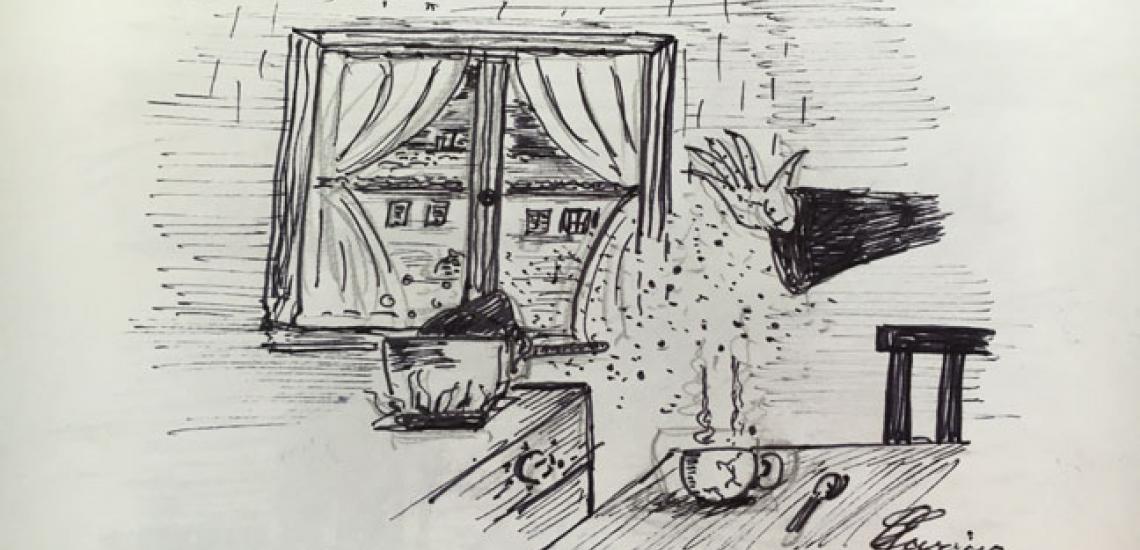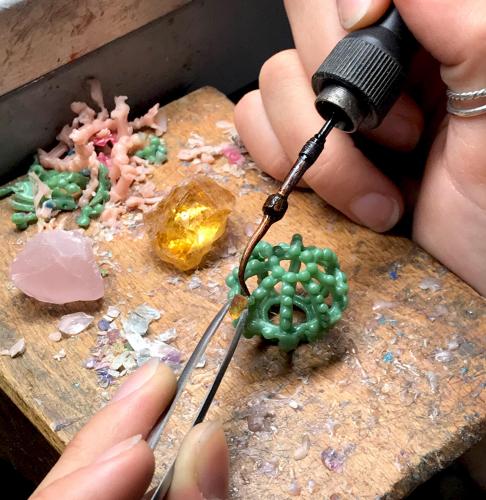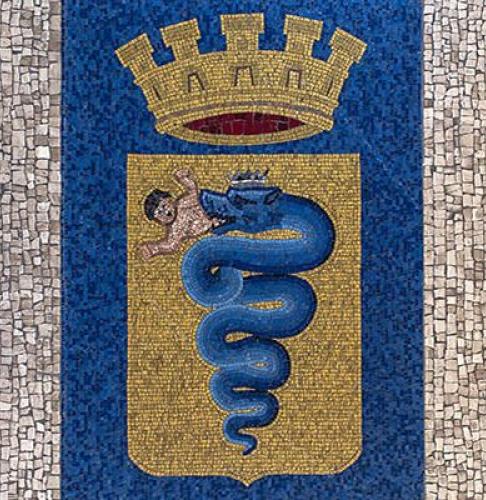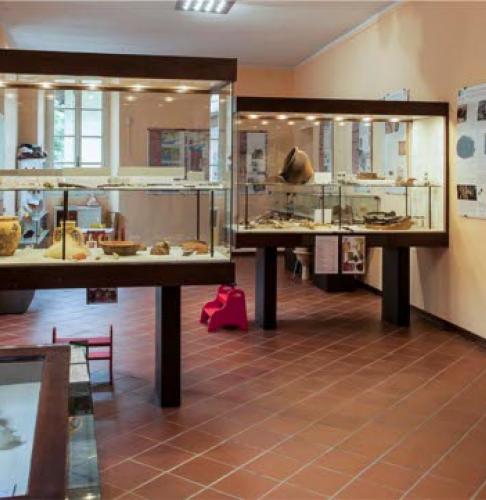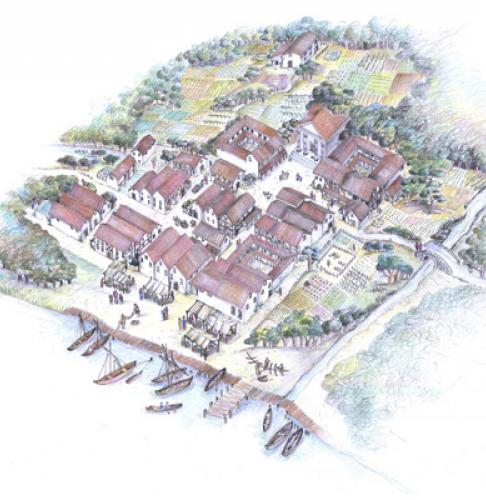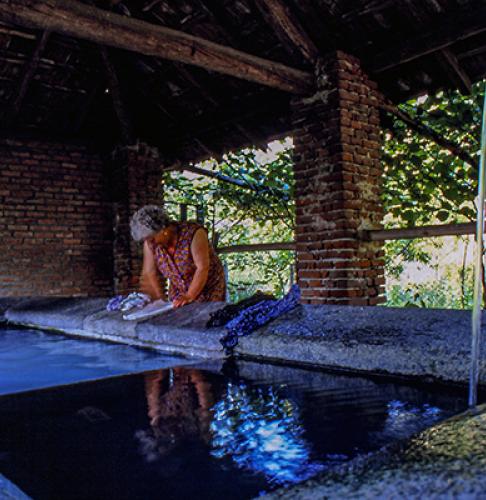Traditions, legends and memories of the people of Angera
Once upon a time…
There are a great many legends that have been passed down to children and grandchildren. These oral tales have been kept alive through collections written by local inhabitants keen to preserve the many legends and life stories that should not be forgotten. We want to tell you some of these stories...
Many years ago in the castle that stands on the hill of the Rocca lived a nobleman who had a daughter, the beautiful Radegonda. The owner of the castle and the inhabitants of the village would have lived in peace if it had not been for the raids of the Marquis Margolfo who always demanded more taxes. If the poor people of Angera could not pay on time, he arrived on horseback with his armies and ravaged the village, setting fire to the fields, the meadows and the houses. Whenever the cloud of dust that announced the arrival of Margolfo was visible in the distance from the tower of the Rocca, the beautiful Radegonda would descend to the village and take refuge in her pavilion, among the tall poplars on the island of Partegora in the middle of Lake Maggiore. But one day when there was so much fog that you could not even see the walls of the castle, the Marquis Margolfo arrived unexpectedly and Radegonda did not have time to leave. When Margolfo saw her, he immediately decided to marry her and the nobleman, though reluctantly, had to grant him his beloved daughter as a wife, because the Marquis was a very powerful man whose demands could not be ignored. He told Margolfo to return in two months, to give them time to prepare the festivities.
The poor Radegonda was desperate. She no longer ate or slept and she spent her days weeping inconsolably, so much that even the stones of the castle felt compassion for her. Shortly before the wedding date, she decided to go to the island pavilion to say goodbye to her dear poplars, to the family of swans who had made a nest in the reeds, to the nightingale who rejoiced with his serenades. But that night the nightingale did not sing. Radegonda looked up to try to find him, but only saw the clouds rushing over the branches. Suddenly she noticed that one of these clouds, white, very bright, was descending on the island. She closed her eyes, dazzled by so much splendour and, when she opened them, there was a beautiful young man next to her. He told her he was the prince of the clouds who, pitying her tears, had come to comfort her. From that evening Radegonda spent her days on the island in the company of the young prince who almost made her forget that the time of the wedding was approaching. But the dreaded day did come. When the Marquis Margolfo arrived with his escort, he could not find Radegonda and no one wanted to tell him where she was hidden. No one except a wicked old woman who lived in a little house by the lake. The old woman had noticed that Radegonda’s rowboat was missing, and it was usually moored on the shore. This was how Margolfo discovered her hiding place and raced to the shore of the lake opposite the little island, calling her, and ordering her to return immediately to the shore or he would go and get her himself. Radegonda remained silent even when a thud and a loud splash made it clear that Margolfo had thrown himself into the water and was swimming towards her. Then the prince of the clouds turned to his sisters, the black clouds, so that they could come to the aid of the beautiful Radegonda. From the sky, suddenly covered with thunderclouds, a thunderbolt fell on the Marquis who turned into a boulder and sank into the lake. Everyone rejoiced at the death of the tyrant, thinking that their troubles were over with him. But it was not completely so.
A few years later the area was hit by a great drought and the waters of the lake were very low. One day a fisherman who was crossing the part of the lake that separates the shore of Angera from the island of Partegora with his boat came close to hitting a rock that he had never noticed before. He stopped, turned around, and saw these words engraved on the rock: “When you see me, you will cry.” And indeed the inhabitants of Angera wept that year, as because of the drought, not even a blade of grass grew in the fields. Even today when that stone emerges from the water of the lake, the grass barely grows in the meadows, but is yellow and sparse just like after the raids of the terrible Marquis Margolfo.
In the darkness of the night, protected from prying eyes, two spades dug into the earth, muddy from the heavy rain that was pelting down and soaking the worn clothes of the two servants who were digging.
"I did not agree to this," one of the two kept repeating in a choked voice. "I had never killed a man before".
"Shut up and dig," the second man ordered with a fierce look.
The first man continued. "His eyes have never stopped haunting me. Our mistress shouldn’t have ordered us to kill him. He had not committed any crime."
"It is not up to us to judge the choices of our masters, we just obey."
"I think we should have spared him."
In a fit of fury, the second man threw his spade into the ground and taking his fearful companion by the collar of his jacket said, "You know that she would have killed us if we had disobeyed her! It was either him or us, and together we chose him!"
At these words the other bent his head in assent and without uttering another word continued to dig. After a while the spades hit the coffin. With their bare hands they swept off the dirt.
"Open it, I do not have the courage myself," the first declared, raising the lamp they had brought with them.
"Coward! Let me do it then." And with that the braver servant removed the coffin lid. The other winced and instinctively turned his head away, closing his eyes: "Well, that’s him alright. What fools we are!” A nervous laugh accompanied the sentence. Although he would be the last to admit it, he had been worried that the body of Saint Arialdo was no longer in the coffin. He himself had spoken to the fisherman of Angera, who swore he had seen a man on the water of the lake who exactly matched the saint's description. His prudence had therefore prompted him to verify that everything was in order.
"That fisherman must have been drunk. Who knows what he saw?"
"When you told me," added the other, "I began to tremble like a leaf and for a moment I thought he must be back for revenge."
"You are such a gullible fool. I really don’t know why I bother with you. Put the lid back on and cover him up."
"You're not going without me, are you?"
"Don’t worry, I'm not going anywhere, but hurry up. I hate this wet weather!" And having said that he moved a few steps away, waiting for his companion to finish. Then he added, "We have to find out if that fisherman really saw someone, or if it was all the fruit of his imagination. We cannot be certain that nobody saw us when we killed Friar Arialdo on Partegora Island. If that’s the case it could mean the end of us. Do not forget that our mistress, Olivia De' Valvassori, is the niece of the bishop of Milan and that she would kill us to hide the complicity of her uncle. After all, Friar Arialdo was stirring up problems for the bishop. He tried to have the bishop excommunicated for allowing the church to sink into decadent customs and to practice simony as well. That's why we had to kill him. He continued shaking his head, partly because of the rain and more to express his disappointment. "He should have realised that the weak shouldn’t challenge the powerful. In any case we will camp on the shore of the lake to see what more we can find out."
The other nodded silently. He would have liked to have grumbled a little more, but he was frightened by the determination of his accomplice. Soaked with rain and feeling the cold, they slept for a few hours, but at the first light of dawn, when a thick mist enveloped the lake making it a place where reality is confused with imagination and hidden thoughts take shape, an intense fragrance awoke them. Still drowsy they got up. With shaky legs, they approached the shore where the perfume was coming from, and suddenly, from out of the fog they saw a boat coming in their direction. The closer the boat came, the more the fragrance intensified.
Anxious to see what the scent was coming from, they took a few steps into the water, but as soon as they reached the boat, their curiosity turned to surprise. It was the perfectly preserved body of Saint Arialdo that was emanating that sweet perfume. They looked at each other and from the face of both they could see not fear, but deep remorse. They stood in silence for some interminable seconds, then the most cowardly said: "We must give him a proper burial". They took the body of the saint and reburied it in a dignified place.
In the Corsia di Mezzo, right on the pavement, there was once a small shop with a row of hooves hanging at the entrance. Inside in the dark, old Surmana would work, sitting on a stool. At that time in Angera almost everyone wore clogs and, when their wood was worn out, they had it replaced by Surmana, who removed the leather that was still in good condition and nailed it onto new wood by means of tiny tacks, the stachètt. From time to time he used to come out of his shop and walk around the village with a cart pulled by a thin, mangy donkey to sell soap, hooves and haberdashery. He would sit sideways on a side of the cart with his legs dangling and calling the customers reciting in a monotonous voice: "O Don, voerì la frisa, butûn, saûn e gucc, zocur e bindèi ..." Both he and his ass looked so poor that the boys, when he passed, shouted:
“Al Surmana gh’aveva un mulet, che da mangiàa che dava i stachètt
e da beu l’acqua piovana l’era l’àsan dal Surmana”.
At Bai del Re, between Barza and Barzola, many years ago lived a small, thin man who, who when he passed through the streets of Angera, distinguished himself from the other inhabitants of the village because during the week he was always dressed as if he were going to a party, in a black hat. He was called il puàta, the poet, but he was more a sort of sorcerer. When the ants came into the room where the silkworms were breeding and threatened to infest the busch of the brüg, they called on the puàta. No one knew what he actually did to get rid of the ants because he worked alone, in the dark, with the doors and windows closed, but his methods were successful and he received payment in kind or money. To add to the mystery of his magical powers, after stormy nights he would say he had fought against the witches who clung to the branches of the trees. He also said he knew where fabulous treasures were hidden, such as the hen with twelve golden chicks, which lay beneath a boundary stone, near his home. And since he was a poet, he said it in rhyme:
“Tra Barza e Barzöra gh'è una pietra cagnöla.
Chi trõva la pietra cagnöla var püssè che Barza e Barzöra”.
Many years ago, on the top floor of a house in the district of Roggione, lived a witch called Lüminina. The exact cause of her early notoriety is unknown, but it is certain that everyone feared her in the village, especially mothers whose young children were thought to be the particular target of witches. Although the isolation in which such women as Lüminina lived certainly made their lives very lonely, the supernatural gifts which people believed they had gave them some power. The witch Lüminina, for example, never needed to go down to the village to shop. This job fell on her neighbour, a young widow with a very much loved child, who wanted to protect her from the witch. One day, the woman went shopping in a hurry and forgot to ask Lüminina if she needed anything. "I was really caught for time,” she apologized on her return. "You will certainly be caught for time!” said the old woman with a menacing look. And then strange things began to happen. A dirty cloth suddenly appeared in the pot where milk was boiling for the baby, her spoon became covered in rust and signs of a curse became so numerous that the poor woman ran to the witch, threw herself at her feet crying and swore that he would always serve her on every occasion, and would never forget again. Her pleas were effective. "From now on, always ask me if I need anything," said the witch Lüminina. And the child was safe.

![Sass Margunin The Margunin Stone - (from L’albero del tempo [The Tree of Time], 2003 Edition) Sass Margunin The Margunin Stone - (from L’albero del tempo [The Tree of Time], 2003 Edition)](/sites/default/files/styles/testata_full/public/articolo/copertina/1649/850/boximmaginetesto-leggendeetradizioni-sassmargunin_784_8802.jpg?itok=482JcZ3f)
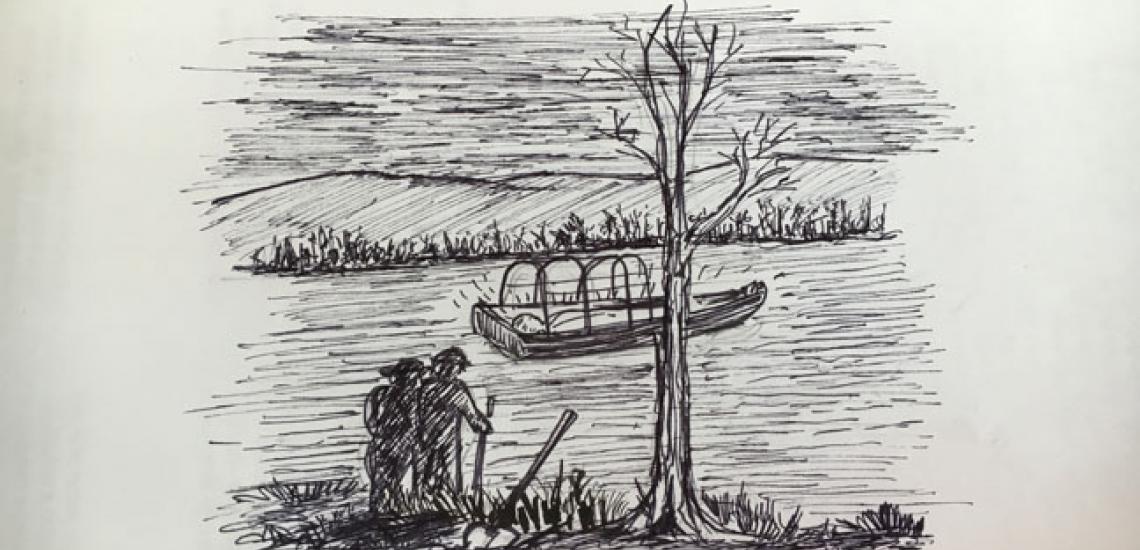
![Surmana - (from L’albero del tempo [The Tree of Time], 2003 Edition) Surmana - (from L’albero del tempo [The Tree of Time], 2003 Edition)](/sites/default/files/styles/gallery_tab/public/articolo/gallery/1649/852/boximmaginetesto-attrazioni-storia-leggende03_784_8587.jpg?itok=B7Oezyft)
![The Poet - (from L’albero del tempo [The Tree of Time], 2003 Edition) The Poet - (from L’albero del tempo [The Tree of Time], 2003 Edition)](/sites/default/files/styles/gallery_tab/public/articolo/gallery/1649/853/boximmaginetesto-attrazioni-storia-leggende04_784_8588.jpg?itok=qaercbHQ)
